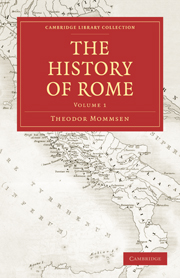Book contents
- Frontmatter
- PREFACE
- PREFATORY NOTE BY THE TRANSLATOR
- EXTRACT FROM DR. MOMMSEN'S PREFACE
- Contents
- BOOK FIRST THE PERIOD ANTERIOR TO THE ABOLITION OF THE MONARCHY
- CHAPTER I INTRODUCTION
- CHAPTER II THE EARLIEST MIGRATIONS INTO ITALY
- CHAPTER III THE SETTLEMENTS OF THE LATINS
- CHAPTER IV THE BEGINNINGS OF ROME
- CHAPTER V THE ORIGINAL CONSTITUTION OF ROME
- CHAPTER VI THE NON-BURGESSES AND THE REFORMED CONSTITUTION
- CHAPTER VII THE HEGEMONY OF ROME IN LATIUM
- CHAPTER VIII THE UMBRO-SABELLIAN STOCK—BEGINNINGS OF THE SAMNITES
- CHAPTER IX THE ETRUSCANS
- CHAPTER X THE HELLENES IN ITALY.—MARITIME SUPREMACY OF THE TUSCANS AND CARTHAGINIANS
- CHAPTER XI LAW AND JUSTICE
- CHAPTER XII RELIGION
- CHAPTER XIII AGRICULTURE, TRADE, AND COMMERCE
- CHAPTER XIV MEASURING AND WRITING
- CHAPTER XV ART
- BOOK SECOND FROM THE ABOLITION OF THE MONARCHY IN ROME TO THE UNION OF ITALY
- APPENDIX: ON THE PATRICIAN CLAUDII
- ADDITIONS AND CORRECTIONS
CHAPTER XIII - AGRICULTURE, TRADE, AND COMMERCE
Published online by Cambridge University Press: 05 October 2010
- Frontmatter
- PREFACE
- PREFATORY NOTE BY THE TRANSLATOR
- EXTRACT FROM DR. MOMMSEN'S PREFACE
- Contents
- BOOK FIRST THE PERIOD ANTERIOR TO THE ABOLITION OF THE MONARCHY
- CHAPTER I INTRODUCTION
- CHAPTER II THE EARLIEST MIGRATIONS INTO ITALY
- CHAPTER III THE SETTLEMENTS OF THE LATINS
- CHAPTER IV THE BEGINNINGS OF ROME
- CHAPTER V THE ORIGINAL CONSTITUTION OF ROME
- CHAPTER VI THE NON-BURGESSES AND THE REFORMED CONSTITUTION
- CHAPTER VII THE HEGEMONY OF ROME IN LATIUM
- CHAPTER VIII THE UMBRO-SABELLIAN STOCK—BEGINNINGS OF THE SAMNITES
- CHAPTER IX THE ETRUSCANS
- CHAPTER X THE HELLENES IN ITALY.—MARITIME SUPREMACY OF THE TUSCANS AND CARTHAGINIANS
- CHAPTER XI LAW AND JUSTICE
- CHAPTER XII RELIGION
- CHAPTER XIII AGRICULTURE, TRADE, AND COMMERCE
- CHAPTER XIV MEASURING AND WRITING
- CHAPTER XV ART
- BOOK SECOND FROM THE ABOLITION OF THE MONARCHY IN ROME TO THE UNION OF ITALY
- APPENDIX: ON THE PATRICIAN CLAUDII
- ADDITIONS AND CORRECTIONS
Summary
Agriculture and commerce are so intimately bound up with the constitution and the external history of states, that the former must frequently be noticed in the course of describing the latter. We shall here endeavour to supplement the detached notices which we have already given, by exhibiting a summary view of Italian and particularly of Roman economics.
Agriculture.
It has been already observed (P. 20) that the transition from a pastoral to an agricultural economy preceded the immigration of the Italians into the peninsula. Agriculture continued to be the main support of all the communities in Italy, of the Sabellians and Etruscans no less than of the Latins. There were no purely pastoral tribes in Italy during historical times, although of course the various races everywhere combined pastoral husbandry, to a greater or less extent according to the nature of the locality, with the cultivation of the soil. The beautiful custom of commencing the laying out of a new town by tracing a furrow with the plough along the line of the future ring-wall shows how deeply rooted was the feeling that every commonwealth is dependent on agriculture. In the case of Rome in particular (and it is only in its case that we can speak of agrarian relations with any sort of certainty), the Servian reform shows very clearly not only that the agricultural class originally preponderated in the state, but also that an effort was made permanently to maintain the body of freeholders as the pith and marrow of the community.
- Type
- Chapter
- Information
- The History of Rome , pp. 192 - 212Publisher: Cambridge University PressPrint publication year: 2010First published in: 1862



